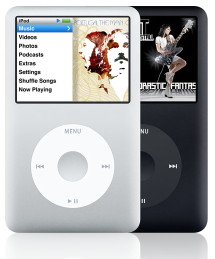Do you own an iPod? I do (I've actually owned several over the past couple of years), and chances are you do too. Well, the ubiquitous product only just recently celebrated its tenth birthday, and its unquestionable success is nothing short of amazing. To a small group of reporters in California, Steve Jobs first announced the 'iPod', a device that could fit your entire music library in your pocket, on October 23, 2001. It was an event of little fanfare, and while Jobs’ claim that the tiny gadget would revolutionize music may have sparked one’s imagination, it wasn’t one that people necessarily believed. Not only were there already a number of MP3 players in the market at this point, but Apple’s offering was essentially little more than small hard drive with headphone jack: what about the iPod was so special? This sentiment was reflected by sales figures from the first few years. Today, however, it’s difficult to imagine life without an iPod, and with a share of over 70% of the MP3 market, it’s clear that Apple struck a chord with consumers.
 |
| Credit: MySchizoBuddy, Wikimedia Commons |
 |
| Credit: RoughlyDrafted |
The iPod was released at a time when there were few options to listen music on demand. Individuals could either play the albums they purchased or illegally downloaded in a media player on their personal computer, or they could carry around a bulky CD player and CDs that typically held, at most, 20 songs. Needless to say, these options weren’t especially convenient. MP3 players existed but didn’t hold many songs and never reached critical mass. The iPod was the best of all worlds, combining the compactness of other MP3 players with the storage capacity akin to home computers. And with the introduction of the iTunes store, Apple had not only changed how we listened to music, but also how we consumed it, and consequently, the music industry itself. People now had legal, à la carte access to practically any song at the click of a mouse and could listen to it wherever they wanted.
 |
| Credit: Apple |
But the iPod wasn't simply a compact storage device, and it didn't just reinvent the music industry. It sparked a revolution. It changed what consumers came to expect from products and the brands that produced them. The iPod is more than music player: it is a door into the world of music. And as a result, today people don't want to just buy a thing--they want the experience that comes with it; just take a look at some of the most successful consumer products recently, such as smartphones and tablets (both of which coincidentally--or not--were also spearheaded by Apple). Additionally, at at time when function dominated form, the sleek design of Apple’s MP3 player demonstrated that these two components complemented one another. And the iPod's customizability, inherent in its name, was unique at the time as well. Inside of their packaging, all iPods are the same, but as user adds more and more of their music, it becomes their own. I wouldn't want anyone else's iPod for an extended period of time, and I'm sure no one would want mine, either. Although many these features may not seem hugely innovative today, that is because the iPod revolutionized consumer products to make them the standard. And if the iPod itself didn’t change society, at the very least it reflects a changed society.
 |
| Image Credit: Adweek |
Dal Ackerman
Undergraduate Northwestern IMC
Twitter: @Dal_Ackerman
No comments:
Post a Comment